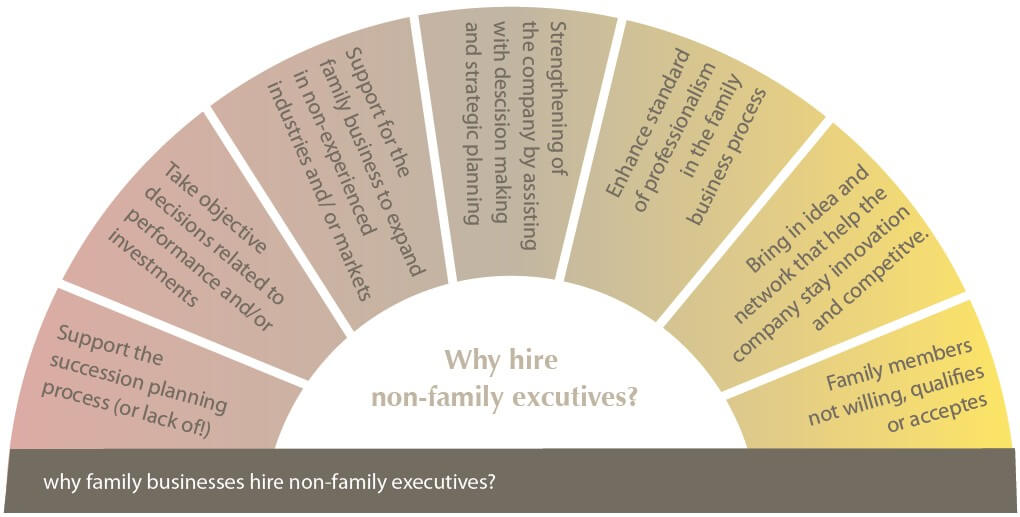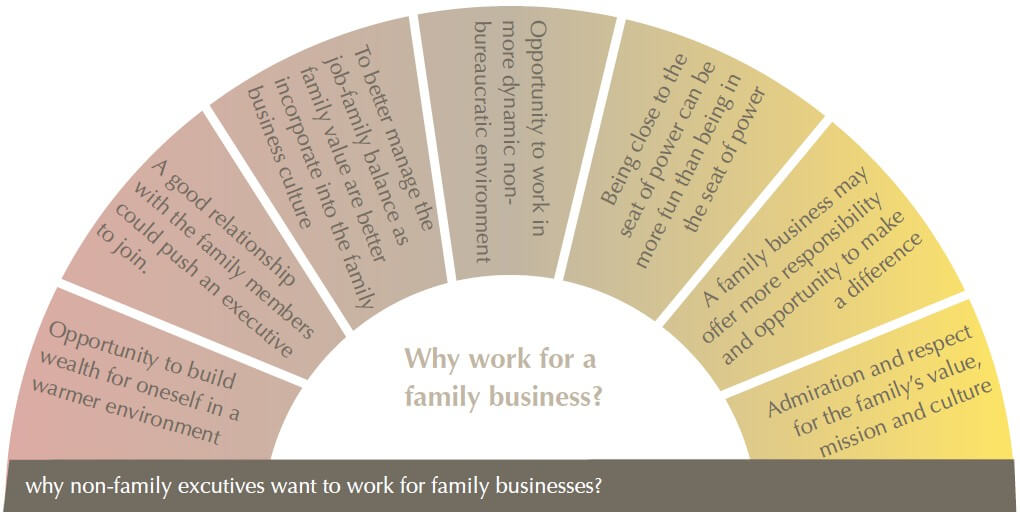Although we would like to think so, it is difficult to transmit values and business ethics from one family generation to another, and one can easily see how building a family governance structure can help ensuring stability in family businesses. Having said that, getting on board non-family executives can help remove emotions from the family business culture but it can also bring a different set of challenges for family-owned companies. In trying to highlight the main advantages of hiring non-family executives and the main concerns for a non-family executive within a family business, Sultan Alturki, COO of the Al Nahla Group in Saudi Arabia, discusses the advantages and challenges in having on board non-family executives from both perspectives and how to maintain non-family executives committed to the family business.
Why do family businesses need to hire non-family executives?
Every family business comes to the stage where it requires advice and expertise from the outside. This situation can be brought on by a lack of experts within the family, by the family being too small in numbers, by the usual fraction of family members that do not wish to enter the family business, or by the family business growing too large to be managed by the family.
Inevitably, a family business sees itself confronted to the conclusion that outside executives are an integral part of long term family business success. Bearing this in mind, filling executive positions with non-family members can help bridging the gap between generations. For instance if the following generation is still too young or inexperienced to hold such a position or if a succession plan is not yet firmly established, someone from the outside can bring stability. Moreover, there is the factor of innovation to consider; bringing in non-family executives can provide new ideas and views that are necessary for critical growth periods in the family business into new industries or markets. And last but not least, having non-family executives in key positions helps to mitigate whatever family conflicts a family business faces.
The integration of non-family executives into a family business can produce numerous benefits (See Graph 1).
As we can see, the advantages for family businesses in hiring non-family executives are clear. However, what is the view on the other side of the collaboration? Why would an executive consider a career in a family business?
Why non-family executives want to work for family businesses?
Family businesses are known to have a long-term strategic orientation and to base the choice of their business relationships first and foremost on trust. Often family values come before business values and this is perhaps one of the reasons why family business leaders prefer to keep key positions within the family. The question arises as to why a non-family executive would subject him or herself to an environment that is prone to a certain degree of nepotism and may sometimes display a lack of professionalism when it comes to corporate structures? As a matter of fact, family businesses offer executives many incentives that a typical corporate may not be able to provide (See Graph 2).
Arguably, the extent of these advantages will vary from one family to another. However, they do in general constitute the kind of work environment one would find within a family business. Nevertheless, experience shows that things do not always run as smoothly as could be wished for.
Why it goes wrong
While there are numerous stories where non-family executives integrate successfully into family businesses and find long term stability, we also witness cases where the attempt to such collaborations turns out rather poorly. The following reasons can lead to the business relationship to fail and to non-family executives leaving the family business:
1. Delegation: Some family members may feel reluctant to delegate certain tasks to someone from outside the family. This may compromise a non-family executive’s motivation and job description.
2. Trust: Depending on the personality of the non-family executive, he or she can fail in gaining the family’s trust, which causes a major obstacle in doing their job particularly when the job is related to banking or finance.
3. Family Conflicts: If there are frictions and different agendas between family members, the non-family executive may find him-or herself trapped in an “in-between” position.
4. Family Culture and Dynamics: Aligning oneself with the family values and culture as well as understanding the family dynamics is a crucial ingredient to successfully integrate into the family business. Inability to comprehend the intra-family dynamics and mismanaging it could lead non-family executive to leaving.
5. Ceilings: Career path or salaries be can be subject to limits. Especially, when the highest roles are filled by family executives due to the aim of maintaining control within the family, this can prevent development of non-family executives beyond a certain point in the company.
6. Emotional challenges: Frustration can be caused by destructive nepotism and the preferential treatment of family members over non-family members without grounds of competency or performance measures.
7. Resistance to change: The non-family executive cannot make a difference because new ideas and change are resisted by the family business. It becomes difficult for non-family executives to perform their job and they may feel resigned.
Some, or all, of the above challenges are likely to arise for a non-family executive; yet, they can be remedied by certain structural and cultural adaptations.
How to make it work
Family businesses, as well as their non-family executives, need to bring certain characteristics to the table in order to be mutually beneficial and to establish a long-lasting working relationship. It comes down to a couple of traits in the organisation and the involved personalities that are either there or need to be acquired.
First, the non-family executive needs to understand and identify with the values of the family. This provides the best foundation for the trust that is so imperative to establish. Secondly, a family business is no place for people who are not team players. It is important for non-family executives to know their place so as to not encourage fear of older family business members that may view the entry of outsiders into the business with scepticism. This is especially vital, if the non-family executive has been hired to replace someone from the family (research shows that the first non-family CEO after a series of family CEOs will often fail). Thirdly, the required complimentary skills and training need to be provided and a real commitment towards the needs of non-family executives has to be present. Fourthly, a non-family executive should bring in the ability to mentor and coach others and should ascertain a behaviour that can be referred to as that of a role-model –particularly in areas like integrity- by the rest of the organisation. In fact, integrity is often more important to family businesses than individual business success. Finally, it is vital, that non-family executives are in it for the long-run. Family businesses, by definition, are interested in long relationships and do not like to be a platform for quick career jumps and short-term opportunistic visitors.
Likewise, the family business has to pull its share of the weight in order to make the integration of non-family executives easier. First and foremost, the family needs to be ready and accepting for change and innovation, as the key value of any outsider is that they bring in fresh views and procedures. Secondly, the family should be willing to recognise and accordingly compensate achievements and performance of non-family members. Thirdly, for everybody’s sake, a clear governance structure should be in place, which allows the non-family executives to refer to a given set of rules, such as in reporting and transparency.
Conclusion
As we can see, the successful integration of non-family executives in a family business is a two-way dynamic and a sensitive balance involving many factors on both sides. The benefits, however, can be significant for the family, as well as for the executive’s career, as long as there is flexibility and an acceptance for the implied trade-offs of such collaboration.
Tharawat Magazine, Issue 6, 2010












